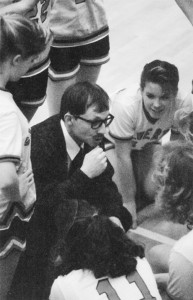
By Brenna Wiegand
Ever wondered where Wooden Nickel’s “Big Eddie Burger” got its name?
Slight of frame, agile, tenacious and rabbit-fast, Silverton native Eddie Willig played men’s slow pitch softball with restaurant owner Glen “Cisco” Damewood who later sponsored the team. Willig kept going with softball, progressing to higher levels, racking up innumerable games and more than his share of wins in an amateur softball career spanning four decades.
Willig mentored, taught, coached, recruited and refereed scores of young people as a career-long teacher and coach, primarily but not limited to the girls basketball teams at Monitor Elementary and Silverton High School, his alma mater.
Now he faces a formidable foe. The diabetes he was diagnosed with in 1994 has stepped up its ravages the past several years.
“It’s something you never own; you just control,” Willig said; “It’s one that’s set to win.”
He’s been in and out of the hospital; wife Lanette assists with daily dialysis, they may end up seeking a kidney transplant.
Lanette (Roth) and Eddie met when he came to Monitor School two years out of college. She was a fairly new aide.
“I went to his classroom looking for the teacher,” she relates. “Turns out he was sitting next to a student, helping him.”
Still wet behind the ears and prickly about “always being the shortest,” Willig rejected her offer of classroom help.
“I didn’t really want to go back in there,” Lanette said. They met again on the basketball court. She was assisting and he’d taken on the girls’ team.
“We were scrimmaging and he threw a long pass down the floor,” Lanette recalled. “I caught it and laid it in. After that he just kind of asked me out and stuff and that was that.” They were married in 1980; both worked at the school until his retirement in 2007.
Willig took the JV job at Silverton High in 1983 and coached with Tom Steers for 17 years.
“We had a goal to build a playoff-level team in five years and did it in three,” he said. They placed at state for seven consecutive years and state champions in 1989 and 1994.
When Steers left in 1999, Willig took over the program the next five years. In 2001 the Lady Foxes were league champions for the first time as a 4A school and made it to the second round at state. So he was shocked when he, in his 23rd year with the program, was told they “wanted to go in a different direction” and let him go.
“Tom and I were the two most successful coaches at the school by far,” he said, “and having a great time with the kids along the way.”

It still leaves a bitter taste in his mouth, but things ended OK.
“That night I got a call from Marty Branch at Chemeketa who said, ‘I hear you’ve been cut loose. Can we talk?’”
All the while Willig was playing (summer) ball, tenaciously riding the crest of its popularity from the time he was 18 till he was 56.
“I played in a national tournament in Lawton, Okla.; tournaments all over the East Coast,” Willig recounts. “We played on ESPN twice.”
The glory days dawned in the early ‘90s when Ray DeMarini of DeMarini Bats tried to recruit Willig at a Rose Festival tournament. When he refused to leave his teammates, DeMarini bought the team.
“The sponsor was a guy on the team’s dad so he was more than happy to save his money,” Willig said. “Ray was my personal sponsor and team sponsor – I have no idea how much money he spent on me.
“I had three bats in my bat bag valued at pretty close to $400 a pop and if I dented one I had a new one the next day so yeah, it was crazy,” he said. “Anytime I didn’t have games I’d play outlaw tournaments.”
Willig, a lead-off hitter who scored from second base six times in one game, started out as a pitcher. When a teammate was injured he headed outfield and never went back.
“We had big guys in left and right field and two rabbits in the middle,” Willig said. “They’d yell, ‘Eddie?’ and I’d yell ‘I think so!’”
“He was pretty fast in the outfield and made good catches,” Lanette said, “and when the pitch came in he could pretty much place it wherever he wanted.” Willig batted 600.
Once after a winter layover Eddie “needed a game” and asked DeMarini if he could play on Worth Bat Co.’s team. DeMarini flatly refused; said he’d call right back.
He did, saying flight tickets, room and rental car were all booked; Willig would play with DeMarini’s Seattle team the next day.
When he walked onto the field the team looked him up and down and were less than impressed. They pointed out the guy he’d displaced and then one stepped forward.
“You’re the guy that’s playing with us?” “Yes.” “You’re on the No. 1 team on the West Coast?” “Yes.”
“I told Ray that wasn’t fun,” Willig said. “He said he’d take care of it.”
“The way I played ball was sometimes considered a little on the rude side,” Willig said. “I understood I came off a little bit rough but I’m not one to be pushed around.”
In 1999 “Big Eddie” was the second person inducted into the Oregon Softball Hall of Fame.
The camaraderie he enjoyed as a team member extended to whole families who’d meet in the off season. But as Willig moved up to B level, then A, even some majors, Lanette said the family element withered. At one time Willig and the shortstop were the only guys whose marriages were intact.
“Lanette’s very much into sports; she has always supported me immensely,” Willig said. “We decided we weren’t having children until we were willing to slow down long enough to spend the time.”
They never had kids, but enjoy a rich life with their large extended family. And there are other things, like the former Monitor School student who calls him dad and wants him to walk her down the aisle in August.
How does “Big Eddie” feel at being, well, benched at 60?
“Like a caged animal,” he said. “I’ve actually just ended up funneling my energy in other ways. I’ll go scout for somebody or go watch and support somebody.”
Eddie brings 30 years of experience and connections to Western Mennonite, where he’s a volunteer assistant.
“He does what he can when he can,” Lanette said. “He has a great sense of humor, likes to tease and is a good one to tell stories. He’s also a good communicator, and with girls that’s big.”
“I laugh because people almost don’t believe my wife now goes to more games than I do, especially with the all the nieces and nephews,” Eddie said. “If I have to stay home she’ll text or call me during the game to let me know how it’s going.”